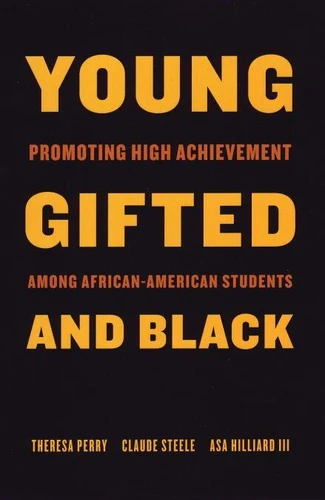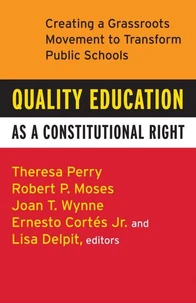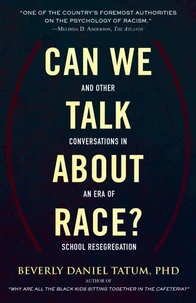Young, Gifted, and Black. Promoting High Achievement among African - American Students
Par : , ,Formats :
Disponible dans votre compte client Decitre ou Furet du Nord dès validation de votre commande. Le format ePub protégé est :
- Compatible avec une lecture sur My Vivlio (smartphone, tablette, ordinateur)
- Compatible avec une lecture sur liseuses Vivlio
- Pour les liseuses autres que Vivlio, vous devez utiliser le logiciel Adobe Digital Edition. Non compatible avec la lecture sur les liseuses Kindle, Remarkable et Sony
- Non compatible avec un achat hors France métropolitaine
 , qui est-ce ?
, qui est-ce ?Notre partenaire de plateforme de lecture numérique où vous retrouverez l'ensemble de vos ebooks gratuitement
Pour en savoir plus sur nos ebooks, consultez notre aide en ligne ici
- Nombre de pages192
- FormatePub
- ISBN978-0-8070-9534-8
- EAN9780807095348
- Date de parution11/09/2012
- Protection num.Adobe DRM
- Taille606 Ko
- Infos supplémentairesepub
- ÉditeurBeacon Press
Résumé
"An important and powerful book" that radically reframes the debates swirling around the academic achievement of African-American students (Boston Review) "The solutions offered by each essay are creative, inspirational, and good old common sense." -Los Angeles Times In 3 separate but allied essays, African-American scholars Theresa Perry, Claude Steele, and Asa Hilliard examine the alleged 'achievement gap' between Black and white students.
Each author addresses how the unique social and cultural position Black students occupy-in a society which often devalues and stereotypes African-American identity-fundamentally shapes students' experience of school and sets up unique obstacles. Young, Gifted and Black provides an understanding of how these forces work, opening the door to practical, powerful methods for promoting high achievement at all levels.
In the first piece, Theresa Perry argues that the dilemmas African-American students face are rooted in the experience of race and ethnicity in America, making the task of achievement distinctive and difficult. Claude Steele follows up with stunningly clear empirical psychological evidence that when Black students believe they are being judged as members of a stereotyped group-rather than as individuals-they do worse on tests.
Finally, Asa Hilliard argues against a variety of false theories and misguided views of African-American achievement, sharing examples of real schools, programs, and teachers around the country that allow African-American students to achieve at high levels. Now more than ever, Young, Gifted and Black is an eye-opening work that has the power to not only change how we talk and think about African-American student achievement but how we view the African-American experience as a whole.
Each author addresses how the unique social and cultural position Black students occupy-in a society which often devalues and stereotypes African-American identity-fundamentally shapes students' experience of school and sets up unique obstacles. Young, Gifted and Black provides an understanding of how these forces work, opening the door to practical, powerful methods for promoting high achievement at all levels.
In the first piece, Theresa Perry argues that the dilemmas African-American students face are rooted in the experience of race and ethnicity in America, making the task of achievement distinctive and difficult. Claude Steele follows up with stunningly clear empirical psychological evidence that when Black students believe they are being judged as members of a stereotyped group-rather than as individuals-they do worse on tests.
Finally, Asa Hilliard argues against a variety of false theories and misguided views of African-American achievement, sharing examples of real schools, programs, and teachers around the country that allow African-American students to achieve at high levels. Now more than ever, Young, Gifted and Black is an eye-opening work that has the power to not only change how we talk and think about African-American student achievement but how we view the African-American experience as a whole.
"An important and powerful book" that radically reframes the debates swirling around the academic achievement of African-American students (Boston Review) "The solutions offered by each essay are creative, inspirational, and good old common sense." -Los Angeles Times In 3 separate but allied essays, African-American scholars Theresa Perry, Claude Steele, and Asa Hilliard examine the alleged 'achievement gap' between Black and white students.
Each author addresses how the unique social and cultural position Black students occupy-in a society which often devalues and stereotypes African-American identity-fundamentally shapes students' experience of school and sets up unique obstacles. Young, Gifted and Black provides an understanding of how these forces work, opening the door to practical, powerful methods for promoting high achievement at all levels.
In the first piece, Theresa Perry argues that the dilemmas African-American students face are rooted in the experience of race and ethnicity in America, making the task of achievement distinctive and difficult. Claude Steele follows up with stunningly clear empirical psychological evidence that when Black students believe they are being judged as members of a stereotyped group-rather than as individuals-they do worse on tests.
Finally, Asa Hilliard argues against a variety of false theories and misguided views of African-American achievement, sharing examples of real schools, programs, and teachers around the country that allow African-American students to achieve at high levels. Now more than ever, Young, Gifted and Black is an eye-opening work that has the power to not only change how we talk and think about African-American student achievement but how we view the African-American experience as a whole.
Each author addresses how the unique social and cultural position Black students occupy-in a society which often devalues and stereotypes African-American identity-fundamentally shapes students' experience of school and sets up unique obstacles. Young, Gifted and Black provides an understanding of how these forces work, opening the door to practical, powerful methods for promoting high achievement at all levels.
In the first piece, Theresa Perry argues that the dilemmas African-American students face are rooted in the experience of race and ethnicity in America, making the task of achievement distinctive and difficult. Claude Steele follows up with stunningly clear empirical psychological evidence that when Black students believe they are being judged as members of a stereotyped group-rather than as individuals-they do worse on tests.
Finally, Asa Hilliard argues against a variety of false theories and misguided views of African-American achievement, sharing examples of real schools, programs, and teachers around the country that allow African-American students to achieve at high levels. Now more than ever, Young, Gifted and Black is an eye-opening work that has the power to not only change how we talk and think about African-American student achievement but how we view the African-American experience as a whole.





